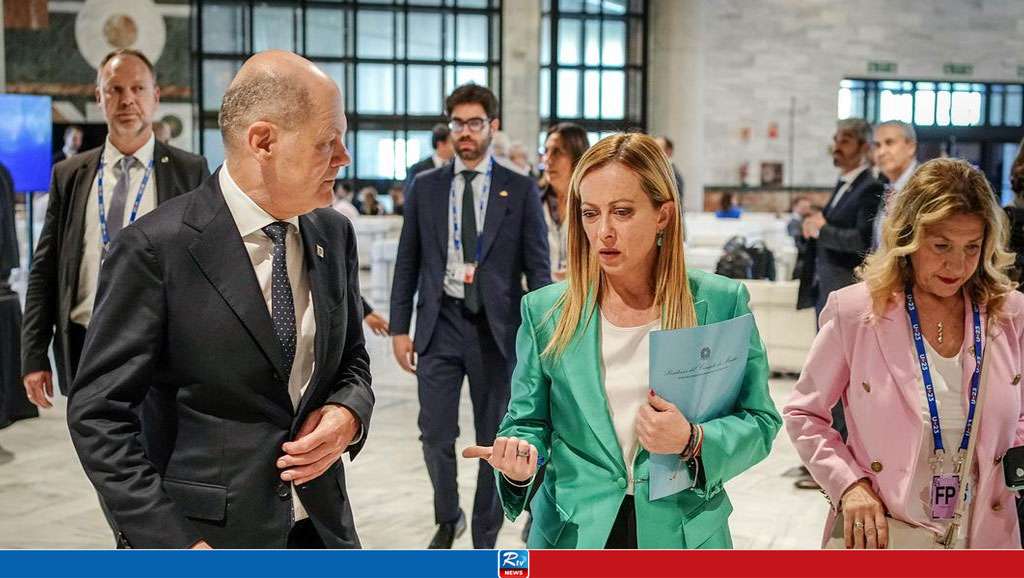Italy is overtaking Germany as Europe's economic powerhouse
While Germany's economy is stalling, Italy is experiencing continued growth. But this has little to do with PM Giorgia Meloni's economic policies and everything to do with subsidies and new debt.
Mauro Congedo has been finding and renovating small architectural treasures with his brother and father for 25 years in Salento — a peninsula in the southeast of Italy that makes up the "heel" of the country.
The apartments and houses that Congedo restores in this rather remote region are now suddenly finding buyers from Germany and England. "Things are going well again," said the 50-year-old architect.
During the coronavirus pandemic, business almost came to a standstill. But what happened afterward in Italy in the industry was "crazy" he says, dragging out the "a" for a long time. But look deeper and Congedo isn't the only one enthusiastic about the economic recovery in Italy.
Italy goes from problem child to head of the class
While governments in Rome were used to announcing depressing growth forecasts and poor debt rankings in the years before the pandemic, the country is now quickly becoming Europe's growth engine.
In the last quarter, the Italian economy grew by 0.6%, while the German economy shrunk by 0.3% in the same period. Beyond this short three-month snapshot, other figures for Europe's third-largest economy are impressive.
"The Italian economy has grown by 3.8% since 2019," said Jörg Krämer, chief economist at Commerzbank. That is "twice as much as the French economy and five times more than the German economy," he told DW.
In Germany, the prospects are indeed looking bleak. The Organization for Economic Cooperation and Development (OECD) predicts growth of 0.3% this year for Germany. Leading German experts are only expecting growth of 0.1%. Italy, on the other hand, is expected to grow by 0.7% this year, according to the OECD.
The Italian stock market is also benefiting from the optimistic mood. The FTSE MIB benchmark index, which is made up of 40 big companies, rose by around 28% last year, more than any other European stock market indices. Italy is on track for more growth.
Trust in the Italian government is returning
It didn't always look so encouraging. Economists initially reacted very cautiously when Giorgia Meloni became prime minister in October 2022. During the election campaign, Meloni and her Brothers of Italy party announced a nationalist "Made in Italy" economic course, agitated against migrants and did not clearly distance herself from Russia.
After her election, the German weekly Stern described her as the "most dangerous woman in Europe." But in terms of economic policy, Meloni has so far largely remained on the same course as her predecessor Mario Draghi. This course is paying off for Italy, at least on the bond market. The interest rate at which the county borrows money is back to the level before she took office.
At a press conference earlier this year, Meloni tried to take credit for the economic upswing. Above all, the lack of political stability in the past had slowed the economy she said, speaking from a position firmly in the saddle.
But how much of the growth is down to Meloni's success?
"Not much," said Krämer from Commerzbank. "The strong growth can be explained by Italy's loose fiscal policy." That means Italy's growth is based primarily on new debt. While the Italian state's new debt before COVID-19 was 1.5% of gross domestic product (GDP), it has shot up in recent years and was 8.3% of GDP in the first half of 2023.
The country's overall mountain of debt is growing, too. In January, the EU Commission estimated that it would exceed 140% of GDP this year and continue to rise in 2025. For comparison, in Germany the debt ratio is 66%, in France it is almost 100%.
Huge construction subsidies inject the economy
To help the economy, the Italian state has been funding various home renovation measures since the end of 2020. For some measures they pay around 50% of the cost, others get even more. The most popular is called the "Superbonus 110" for energy-efficient renovations.
Through this program anyone who renovates their house or apartment to make it more energy-efficient will get the entire expenses plus a 10% refund on top through a tax reduction scheme.
"You can imagine that construction investments have skyrocketed," said economist and Italy expert Krämer. "This effect explains two-thirds of the strong growth we are seeing."
The architect Mauro Congedo is not overly enthusiastic about the Superbonus 110 program. Everything has become more expensive. On top of inflation, the program drove up the costs of materials and workers.
"If the state pays for everything, then people don't care how much it costs," said Congedo. In addition, no one controls the prices. Construction companies from Naples, Bari and the provincial capital Lecce asked him several times to adjust his costs upward. "They wanted me to charge twice as much. I didn't do it. It feels like stealing," he said.
He thinks a bonus for the energy-efficient renovation of buildings is a good thing in general. However, owners should have to contribute to the costs and not just get it all from the government. Congedo doesn't think much about Giorgia Meloni either. The only good thing she did was get the Superbonus 110 program under control, he says.
Money from the European Union
In fact, the ultra-right head of government has slowed down the Superbonus program introduced by the left-wing Five Star Movement. In 2023, it covered a maximum 70% of costs and this year up to 65% of the renovation costs.
Nevertheless, the tax credits resulting from the program will significantly reduce government revenue in the next few years. For the government in Rome it is probably very convenient that billions are still flowing — primarily from Brussels. Italy is one of the biggest recipients of the EU's COVID recovery fund.
By 2026, almost €200 billion ($216 billion) will be paid out to Italy in the form of subsidies and loans. "The Italian state must reduce its very high budget deficit by this time at the latest," said Krämer. "If they only start saving then, then this Italian growth miracle will probably end because they didn't use the time for structural reforms."
Mauro Congedo is worried that remnants of the Superbonus 110 program will remain for a long time. "The prices are very high, and we have incurred a lot of debt."
Luckily, he won't run out of work anytime soon. He's currently working on eight projects at the same time.
03 Apr 2024,21:04




















 Live Tv
Live Tv









